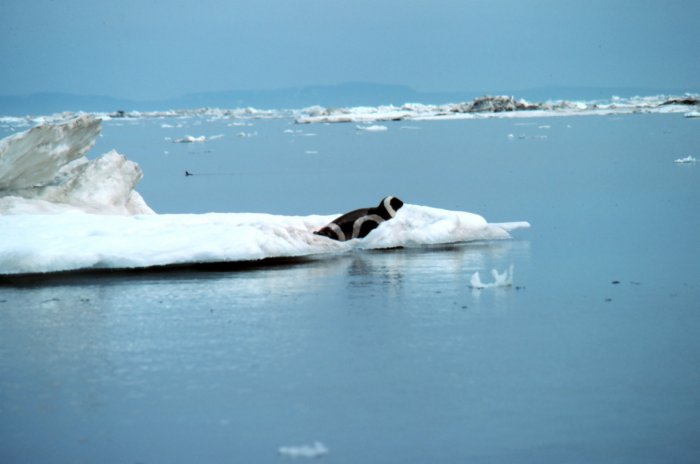|
| 질의: arctic bear | 결과: 217번째/272 | |
Ribbon Seal (Phoca fasciata) - Wiki
| 제목: | Ribbon Seal (Phoca fasciata) - Wiki
| |

| 해상도: 700x464
파일크기: 31127 Bytes
등록시간: 2007:02:27 00:17:34
|
Ribbon Seal
From Wikipedia, the free encyclopedia
[Photo] en: ribbon seal (Phoca fasciata) de: M??nnliche Bandrobbe. photographer: Budd Christman. place: Beringsee, Juni 1979 (Bering sea). source: National Oceanic and Atmospheric Administration.
The Ribbon Seal (Phoca fasciata) is a seal from the family Phocidae. It can be found in arctic regions.
Physical description
Adult seals are recognizable by their black skin, which carries four white markings: a strip around the neck, one around the tail and a circular marking on each body side, which encloses the front fins. The contrast is particularly strong with the males, while with females the difference in colour between bright and dark portions is often less conspicuous. Newborn ribbon seal pups have white natal fur. After moulting their natal fur, their colour changes to blue-grey on their backs and silvery beneath; after some years some portions become darker and others brighter, and only at the age of four years does the typical design show.
Ribbon seals can grow about 1.6 m (5 ft) long, weighing 95 kg (209 lbs) in both genders.
Habitat
Ribbon seals live in the arctic parts of the Pacific Ocean, especially in the Bering Sea and the sea of Okhotsk. They live on ice shelves, and never come to the coasts.
Behaviour
Their diet consists almost exclusively of pelagic fish, like pollock, eelpout and arctic cod; only young seals eat crustaceans as well. Ribbon seals are solitary and form no herds. Young animals are born on the ice, are fed for four weeks on their mother's milk, and then leave their mother. They remain on the ice for a few more weeks in which they lose their dense white fur and lose weight drastically. After this period, they are able to dive and hunt by themselves. Predators of the ribbon seal include the killer whale, Greenland shark and polar bear.
Protection
Young ribbon seals look like young Harp Seals, and like these, they were hunted for their fur. Since they do not form herds, ribbon seals were more difficult to catch than harp seals. Since the Soviet Union limited the hunt on ribbon seals in 1969, their population has recovered. The current population is around 250,000.
http://en.wikipedia.org/wiki/Ribbon_Seal
| The text in this page is based on the copyrighted Wikipedia article shown in above URL. It is used under the GNU Free Documentation License. You may redistribute it, verbatim or modified, providing that you comply with the terms of the GFDL. |
|
^o^
동물그림창고 똑똑전화 누리집
^o^
|
|